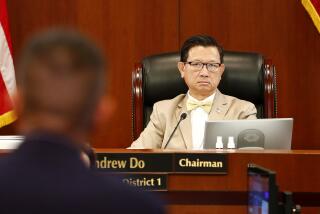Board’s Actions Don’t Show ‘Good Faith’
- Share via
Question: I sit on the board of my condominium association in Rancho Palos Verdes, and I don’t like how the other board members manipulate the published minutes reported to the other homeowners.
Homeowners who attend meetings are allowed to raise issues before the board, but the board’s secretary and the rest of the board parses the homeowner’s words when they report it in the minutes. They intentionally twist what the homeowner says, then publish something the homeowner did not say or intend, but they attribute the quote to the homeowner. It is impossible for the homeowner to rectify this because the board has an unspoken rule to ignore homeowner contact.
We put things in the minutes that did not occur at the meeting. We falsify what we discussed during the executive session, and we basically cover ourselves with stuff we did not want to discuss in front of other homeowners. We also don’t report the many gifts the management company and other vendors give us either.
I’ve been going along with these fraudulent routines for the six years I’ve been on the board. One board matriarch keeps telling us that because we are “volunteers” the law covers our actions and we can’t get in trouble. I know as a board we’ve done some other things we should not have done, but the homeowners will never learn of these acts.
The president of the board tells us the attorney advised him that all we have to say is “whatever we do we did it in good faith.” Is this true, or can I as a board member get in trouble for these things? If we are sued, will the courts protect us?
Answer: Your troubles were set in motion by your board’s actions, then compounded by the attorney’s advice to simply mouth the words “good faith” as a defense.
With privilege comes responsibility and you and your board have apparently enjoyed the former and ignored the latter.
Intentionally misrepresenting homeowner statements at monthly meetings, then falsely circulating them, is not tantamount to “good faith.” It is possible that those actions constitute a fraud. Courts do not protect people; they serve as the arbiters of whether what was done meets the applicable legal standard for the case being tried.
If the acts do not meet that standard, board members may be personally liable for damages their actions may have caused.
Aside from the legal responsibility to repair and maintain the commonly owned property, every California homeowner association board member is held to a “reasonable standard of care,” and must perform in accordance with the “ordinary prudent person standard” in making reasonable inquiries, serving all homeowners in good faith and making decisions in the best interests of the association (Corporations Code section 7231).
To avoid impropriety, homeowner association directors should disclose any conflict of interest involving transactions or material financial interests to the homeowners for their approval. Disclosure includes any vendor gifts to board members.
The Corporations Code says that a board member with a conflict should refrain from voting on related issues.
The cavalier attitude of not worrying about your actions because insurance covers “volunteer” members is a breach of loyalty to all the homeowners. The Corporations Code also states that “a person who performs the duties of a director in accordance with” the Code “shall have no liability based upon any alleged failure to discharge the person’s obligations as a director.”
But if the insurance company feels that the acts of the director were not a part of the person’s obligations they may decline to cover that member for those acts, possibly exposing board members and other homeowners to liability.
Civil Code section 1365.7 of the Davis-Stirling Act accords a statutory immunity for homeowner association board members, protecting them from personal liability if the following conditions are met: (1) The act or omission was within the scope of the director’s or executive officer’s duties; (2) The act or omission was performed in good faith; (3) The act or omission was not reckless, wanton, intentional, or grossly negligent; and (4) Damages caused by the act or omission are covered pursuant to the association’s liability insurance policy, which must be in place in accordance with the Act.
The code adds “the volunteer director or volunteer executive officer shall not be personally liable for the damages if the board of directors of the corporation and the person had made all reasonable efforts in good faith to obtain available liability insurance.”
These statutes were enacted so homeowners would volunteer to serve on association boards without fear of personal liability in a lawsuit. They were not passed for board members to circumvent the law or their duties.
Merely saying you acted in good faith is insufficient to establish that you, in fact, did.
*
Stephen Glassman is a writer and an attorney specializing in corporate and business law. Donie Vanitzian, J.D., is a writer and arbitrator and manages commercial property. Send questions to: Common Interest Living, P.O. Box 451278, Los Angeles, CA 90045 or e-mail queries to cidcommonsense@aol.com.
More to Read
Sign up for Essential California
The most important California stories and recommendations in your inbox every morning.
You may occasionally receive promotional content from the Los Angeles Times.













